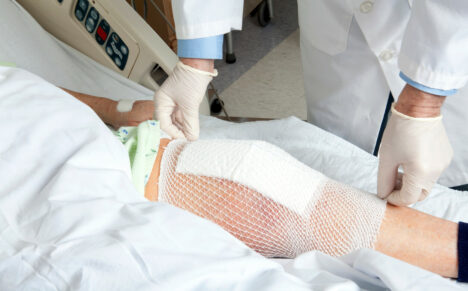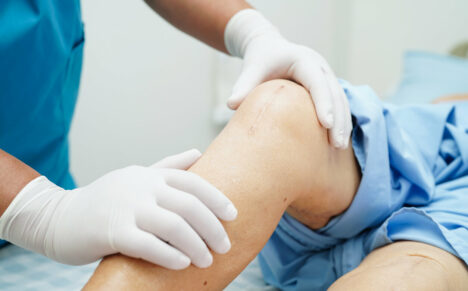A total hip replacement has become very routine, but it is still a significant surgical procedure that involves replacing the damaged hip joint with a prosthetic implant. With this type of surgery, the recovery process plays a major role in ensuring that you regain mobility and get back to your normal life as soon as possible. You can learn more about the recovery process and what you can expect week by week in this blog.
Keep in mind that every individual’s recovery time and experience will vary, but this guide will give you a general idea of what to expect on your journey to regain mobility and independence and in becoming pain-free.
Deciding To Have Total Hip Replacement Surgery
Total hip replacement surgery is one of the most common joint replacement procedures in the United States, with more than 450,000 surgeries performed each year. It is also one of the most successful operations, with advancements in joint replacement surgical techniques and technology significantly increasing the effectiveness of the procedure.
However, the decision to undergo total hip replacement surgery requires careful consideration with the help of your family, primary care provider, and following a thorough evaluation by an experienced orthopedic surgeon. This is because, as with all types of surgery, there are risks involved, and different factors, such as your overall health, the severity of your hip condition, and post-operative care, will determine the success of the procedure.
Recovery – Week by Week
Total hip replacement surgery typically requires an overnight stay in the hospital, but if you have an outpatient procedure done, you may be able to return home on the same day as your surgery. The success of hip replacement surgery ultimately depends on how well you follow your orthopedic surgeon’s instructions regarding home care during the first few weeks after surgery. Generally, you can expect the following:
Week 1: Post-Surgery and Hospital Stay
The first week after surgery is generally focused on managing any pain, swelling, and other post-surgery symptoms. During this time, you’ll likely receive:
- Pain medication if needed to help manage discomfort
- Anti-inflammatory medication to reduce swelling
- Physical therapy sessions, beginning within a day or two after surgery
It is important to start physical therapy soon after surgery to help facilitate optimal joint healing and to prevent the risk of complications, such as blood clots. During the first few days, you may experience difficulty moving and getting in and out of bed, using the bathroom, and performing other daily activities. Make sure to follow your doctor’s guidance on using mobility aids, like a walker or crutches, during this time and try to ensure you have someone at home to help you with day to day tasks.
Your surgeon will monitor your progress and condition with regular office visits and will coach you through the recovery course, along with your physical therapist.
Week 2: Home Recovery and Basic Activities
Exercise is a critical component of your recovery, especially during the first few weeks following surgery. Your physical therapist will create a customized program to promote healing and recovery.
The second week of recovery typically involves:
- Continuing physical therapy, with specific exercises to restore movement and strength
- Gradually increasing mobility (e.g. walking short distances inside and outside the home)
- Slowly incorporating basic activities, like climbing stairs, getting dressed, and using the bathroom with minimal assistance
At this stage, it’s crucial to follow your therapist’s advice on exercises and walking to help improve muscle strength and prevent blood clots. During this time you will work with an outpatient physical therapist help you through the initial recovery process.
Weeks 3-4: Further Mobility and Independence
By the third and fourth weeks, you might notice:
- Reduced pain and swelling
- Increased range of motion
- Ability to walk longer distances
During these weeks, you should be able to start doing light chores and return to some of your regular hobbies. However, it’s important not to push yourself too hard or engage in high-impact activities that could jeopardize your recovery. It is not uncommon to experience some discomfort with activity and at night for several weeks.
Weeks 4-6: Returning to Work and Normal Activities
During the fourth to sixth week, many individuals can:
- Return to work (depending on job requirements)
- Drive again (after getting permission from your doctor)
- Engage in low-impact exercises
Keep in mind that heavy lifting, squatting, and other high-impact activities should still be avoided during this time.
Weeks 6-12: Full Recovery and Long-Term Care
The final stage of recovery includes:
- Regaining full mobility and independence in daily activities
- Resuming most pre-surgery activities and exercises
- Continuing long-term physical therapy, as needed
At this point, most individuals make significant progress and can return to their normal lives with few restrictions. You can expect to be largely pain free from around 4 to 6 weeks following surgery, if not sooner.
Remember that individual experiences will vary, and it’s essential to follow your doctor’s guidance on your specific recovery timeline and restrictions. Maintaining a positive attitude, staying patient, and putting in the work during physical therapy sessions will contribute to a successful total hip replacement recovery.
It’s crucial to follow all post-operative instructions carefully and take care of yourself during this critical period of healing. If you experience any unusual symptoms or issues during your recovery, make sure to consult with your doctor immediately. With time and patience, you can expect to regain mobility and get back to enjoying a pain-free life after total hip replacement surgery.
Total Hip Replacement in Raleigh, Apex, and Durham, NC
If you are considering total hip replacement surgery, visit board-certified and fellowship trained orthopedic surgeon Dr. Brett J. Gilbert for expert care. Dr Gilbert specializes in hip replacement and recommends a minimally invasive, muscle-sparing approach, when applicable to a patient’s specific needs. He will assess your condition and provide you with the guidance and information you need to make an informed decision about your treatment and recovery.
Don’t let hip pain prevent you from doing the activities you enjoy. Call our office today at (919) 788-8797. You can also request an appointment with Dr. Gilbert using our appointment request form, or you can self-schedule your appointment here.




